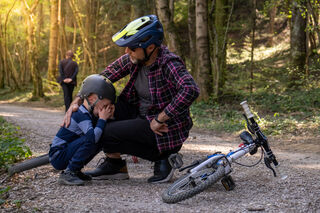Cross-Cultural Psychology
Culture Shapes Who We Should Help
What children and adults believe about helping behavior.
Posted August 25, 2022 Reviewed by Lybi Ma
Key points
- Adults often think that family should be most likely to help each other, and strangers least likely.
- Young children tend to think everyone should be helpful.
- There are also big cross-cultural differences in the belief about whether family, friends, and strangers should be helpful.

Suppose you’re in a hurry to get somewhere and as you’re walking down the street, you see someone struggling to pick up groceries from a bag that broke. Suddenly, you notice that the person gathering the lost goods is your uncle. Chances are, you stop to help. What if the person was a friend of yours? Would you stop then? How about a random stranger?
Most of you probably have the intuition that you would be most likely to help your family member, likely (but perhaps less likely) to help a friend, and least likely to help a stranger. There are even evolutionary theories that suggest that because you share more DNA with your relatives than with other people, perhaps we should be wired to help our family more than people we don’t know.
Is this tendency to help family more than friends, and more than strangers, wired into us as humans? This question was explored in a paper in a 2022 issue of the Journal of Experimental Psychology: General by Julia Marshall, Anton Gollwitzer, Kellen Mermin-Bunnell, Mei Shinomiya, Jan Retelsdorf, and Paul Bloom.
They did two developmental studies in which they had children between 5 and 9 years of age respond to a series of scenarios. They had adults address the same scenarios. One study looked just at children and adults from the United States, while the other looked at children and adults from several different countries.
In the first study, participants heard about scenarios in which a child needed help (in one scenario, a child was hungry, and in a second a child fell and was injured). They were told that someone (a parent, a friend, or someone they didn’t know at all) saw the child. They were asked whether the person had to (that is, was obligated to) help.
The youngest children essentially felt that everyone should help. They felt slightly less strongly about strangers than about family and friends, but only slightly. As children got older, they increasingly differentiated between people, they continued to believe that family should help but thought friends had less of an obligation, and strangers even less of an obligation. This pattern was strongest for the adults who were surveyed.
There are two explanations for this pattern. One is that the youngest children just aren’t that good at differentiating among people and that as they get better at it, they show a pattern that fits the adult intuition. The other possibility is that children gradually learn from the adults around them about what to expect related to helping behavior.
To explore this question, the second study looked at children and adults from a variety of countries (the US, Germany, India, Japan, and Uganda). In this study, the youngest children from all cultures felt that all people should be helpful. In the US, Germany, India, and Japan, there was a tendency for older children and adults to show a pattern like the one described earlier in which they differentiated between family, friends, and strangers. Interestingly, in Uganda, there was a strong tendency for adults to believe that everyone should be helpful. As a result, as children got older, they actually strengthened their belief that everyone should help.
This pattern of results suggests that young children have a general belief that people should be helpful and that they ultimately learn from the adults around them how to think about helping behavior. They eventually learn to adopt the mindset of the adults in their culture—even though different cultures have different approaches to helping behavior. These data also suggest that the pattern that fits the evolutionary prediction is not hard-wired into people's brains.
References
Marshall, J., Gollwitzer, A., Mermin-Bunnell, K., Shinomiya, M., Retelsdorf, J., & Bloom, P. (2022). How development and culture shape intuitions about prosocial obligations. Journal of Experimental Psychology: General, 151(8), 1866–1882.


